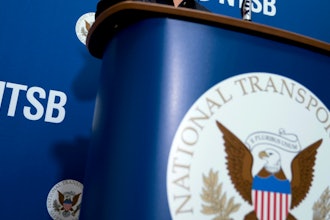NEW DELHI (AP) — Much has been made of the new India, with its tech-savvy workers, rampant economic growth and emerging middle-class consumers eager for the latest brands from New York, Paris and Milan.
On Monday, the other India raised its hand.
Some 27,000 representatives of impoverished, malnourished, illiterate and dispossessed India gathered on a massive fair grounds in central New Delhi, hoping to march to Parliament with their single demand — give us land.
Perhaps indicative of the plight of the poor, police locked them up — chaining the gates to the vast, dusty Ramlila fairgrounds and barricading the thousands of demonstrators inside.
Monday was to have been the culmination of a monthlong, 300-kilometer (185-mile) march north from the city of Gwalior to the national capital with their message: The masses have been largely untouched by India's economic boom.
''Day-by-day the Sensex goes up but the common people get nothing from this,'' said Anil Gupta, a march organizer, referring to the Bombay Stock Exchange's benchmark index, which closed at a record high Monday.
''People here are asking only for the basics. There is no greed. They don't want cloth or electricity, just land so they can feed themselves,'' he said.
''I just want a small piece of land so I can grow some vegetables,'' said 35-year-old Dherum, who like many from India's indigenous tribes goes by one name.
Dherum joined the march in his home in the jungles of India's Madhya Pradesh state, the same jungles that inspired Rudyard Kipling's ''The Jungle Book.'' He feeds his five children on an average of 20 rupees (US$ 0.50; euro0.35) a day made by selling firewood foraged from the jungles.
''My father died doing this work, I'll die doing this,'' he said. ''Give us some land to farm something, nothing else.''
Marchers say they can take a month to protest because they have nothing at home. And, at least here, they get a meal a day from the organizers.
The call for land resonates in a country where some 70 percent of India's 1.1 billion people are directly dependent on agriculture for their livelihoods, many eking out an existence as subsistence farmers or itinerant laborers.
Poverty among them is rife. About 450 million Indians live on less than US$1 a day, according to the World Bank.
The march brought together India's traditionally landless people — the ''untouchables'' and tribals at the bottom of the country's complex social ladder — and the newly landless, forced from their fields by new economic projects.
India is trying to attract foreign investment to spur its economy and help develop its largely backward infrastructure. In part, it has chosen to do this by setting up Special Economic Zones, where companies get tax breaks to set up business and factories.
But critics say farmers are often forced from their land or cheated on its value when the area is acquired for these projects.
Priya Bishnu's family has fished eastern India's massive Chilika lake for prawns for centuries. But they left the area recently after large companies were granted the rights to set up massive prawn farms in the lake.
''When the government gives the multinational companies land where does it come from? That's our land,'' said 33-year-old Bishnu.
''It should be our right to fish the lake and sell the prawns,'' she said as sat with other marchers under a sign of Indian pacifist icon and independence leader Mohandas K. Gandhi.
This protest has been peaceful, following the theory of passive resistance set out by Gandhi, but the fears and frustrations of others have overflowed into violence.
The government canceled a plan to acquire 8,900 hectares (22,000 acres) of land in eastern India for a petrochemical plant and shipyard after the deaths of 14 farmers in clashes with police. Another 15 people have died since then in sporadic violence.
The march organizers, the group Ekta Parishad, or Unity Forum, demanded a national body be set up to look into the land issue and amend India's vague property laws and endemic corruption that allow farmers to be strong-armed off their land by powerful landowners.
In an apparent answer to the protests, Prime Minister Manmohan Singh's office announced later Monday that a National Land Reforms Council — with Singh as chairman — would be established. Officials in his office were not available to discuss the details of the plan.
But activists were skeptical.
''They talk about helping the average man but the policies are anti-poor,'' said Gupta, noting that legislation already enacted to provide land rights to the tribes has not been enforced.
''But when a multinational needs land the government organizes everything for them,'' he said.






















